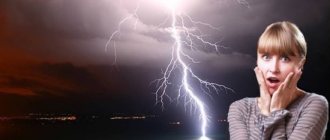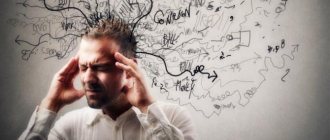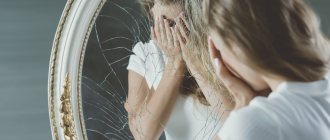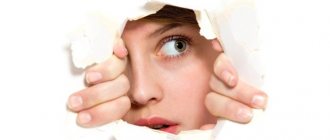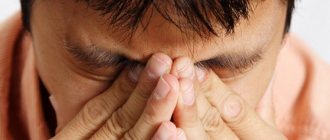Fear of losing consciousness from a physiological point of view
First, I would like to consider the fear of losing consciousness from a physiological point of view - is it even possible to faint during a panic attack. The fact is that if we take the most common cases of panic attacks. It should be noted that during an attack a large amount of adrenaline is released - accordingly, a person’s pulse quickens and blood pressure rises. The flight or fight response is fully activated, and the body is mobilized to its maximum capacity in order to survive. It's hard to imagine that a person can lose consciousness when he needs to. For example, to escape from some danger in the form of a person running after him with a knife or a gun, a tiger or any other aggressive animal.
In fact to lose consciousness during a panic attack, because people usually lose consciousness when their blood pressure drops sharply. And during an attack of panic fear, a person experiences a surge of adrenaline - in such a state to lose consciousness . Although in this case it often seems that the person actually loses consciousness: his vision may become blurred, and he may feel as if the ground is disappearing from under his feet. He may feel the unreality of what is happening. With all these signs, a person may actually think that he is about to pass out. But in practice, 99% of people in such situations never switch off. 1% is a small error that does not affect most.
Fear of judgment from others
The second thing that a person prone to panic attacks fears along with the fear of losing consciousness is the fear of looking ridiculous when fainting, the fear of causing condemnation or ridicule. The very fact of possible fainting worries him much less than how he will look and what the people nearby will think about him. That is, a person is not worried about the possibility of losing consciousness , but about what will happen after that. He develops a fear of appearing to be an alcoholic or crazy, a fear of being robbed, etc. Parents often have a fear of losing consciousness when they are with their children: “What if I faint - what will happen to my child?”
How to get rid of dizziness with VSD?
For people susceptible to systematic dizziness due to VSD, spontaneously occurring attacks interfere with movement, cause discomfort, cause psychological trauma, and during this period they are poorly oriented in space.
In such situations, a person begins to look for the causes of attacks. The main task remains how to get rid of dizziness during VSD.
First of all, you need to completely eliminate thoughts about the attack itself and dizziness, avoid stress and psycho-emotional stress. If you have a persistent feeling that an attack is approaching, you must:
- Take a comfortable position, sitting or lying down (the attack may then disappear after a few minutes).
- Ventilate the room.
- Massage your forehead, temple area, earlobes.
- Try to look at one point.
- Take a sedative.
- Stabilize blood pressure (take blood pressure-lowering medications).
- Take a warm shower.
How to overcome the fear of losing consciousness and fear of fainting?
These fears need to be worked through. You need to work either with fears that you will be robbed, or with fears of what they will think of you and how you will look. This, again, depends on self-esteem, on a person’s attitude towards himself. It is necessary to give yourself the attitude: “I must be calm and confident, and fainting, losing consciousness - this does not fit into my idea of myself at all.” Here you just need to remember that to lose consciousness during panic attacks, and then you need to work on your thoughts, play them out, work on your beliefs about yourself - and then the fears of losing consciousness will gradually pass.
How to deal with a phobia
It is important to understand what worries you: the fear of fainting or what will happen after. Are you struggling with a psychological mania or a health problem?
If you are concerned about what others think of you, this indicates problems with self-esteem. You shouldn’t take criticism from the outside world so sharply, you shouldn’t be afraid to seem funny in their eyes.
Remember that it is physiologically impossible to faint from high blood pressure. If you are psychologically attuned to this, then the chances of fainting will appear . You need to work on your thoughts, fight your fears, form the belief that you cannot lose consciousness during a panic attack.
Playing out fears
This psychological method is an effective way to overcome your phobia. Let fears into your brain, realize that you are afraid not of the fact of fainting, but of its consequences. Such fear is not associated with fear for health, but with a complex of unfulfilled life. Maybe it's time to pay attention to your shortcomings along the path of life?
Some experts advise facing your fear in order to cast aside doubts: supposedly lose consciousness and look at people’s reactions. To the man's surprise, no one would even think of laughing at him. Some people will try to help, others won't care. Fear of an indifferent reaction can also cause the development of a phobia. Carrying out such an experiment will help develop resistance to public opinion, which is very useful for the nervous system. Often we ourselves project our fears and complexes onto others. It seems to us that everyone notices our shortcomings.
Action plan
First of all, visit a therapist to identify or exclude possible pathologies in the body. If no serious problems are found, proceed according to the scheme proposed by the professionals.
- Make an appointment with a psychotherapist so that he can prescribe you a course of treatment with sedatives.
- Follow your daily routine and diet, you will soon feel in good shape, you will have a feeling of vigor, which will have a beneficial effect on the nervous system.
- Do something interesting, find a hobby that will distract you from focusing on the problem, but do not overdo it, overloading yourself with mental labor.
- Train yourself to take daily walks in the fresh air, and then your mood will no longer depend on the weather.
- Buy a special fitness ball; it relieves tension and has a beneficial effect on the functioning of nerve endings.
Meditation
Do not rush to seek the help of medications. Your problem is psychological in nature, try to cope with it on your own. A great way to do this is to meditate regularly. Below is a sample lesson:
- Sit on a flat surface, take a position that is comfortable for you. This could be the lotus position. The main thing is that your back is in a straight position and you do not feel stiff.
- Throw all extraneous thoughts out of your head and try to relax. This is the basic condition of the meditation process.
- Imagine that you are sitting on the seashore. The breeze rustles slightly, waves crash against the shore, seagulls scream in the distance. All problems are left behind.
- Throughout the session, alternately take deep breaths and exhale. Take your time.
Experts recommend spending 15-20 minutes a day on exercise. The good thing about meditation is that you can do it anywhere, even if you set aside some time in the middle of the workday.
Remember that you need to say “no” to fainting during a panic attack. It's just fear. Don't let your phobias control you, fight their manifestations.
How to overcome fears of losing consciousness?
To get rid of fears of losing consciousness , you need to play them out - that is, allow them into your brain. A person needs to understand that these fears are unreal, they are just his thoughts. You need to realize that he is afraid not of the fact of fainting. And what will happen after. This is equivalent to the fact that a person during a panic attack is not afraid of death itself. And he is afraid of what will happen after - that his relatives will be left without him, that he will not have time to do something, to implement some plans. In fact, the fear of losing consciousness is not the fear of death. And the fear of life, the fear of one’s own unfulfillment. This is what needs to be worked out as a whole.
It's the same with the fear of losing consciousness . A person cannot lose consciousness due to a panic attack or of their own accord. And in order to get rid of precisely the fear that if he loses consciousness, others will think badly of him. There are certain behavioral techniques when a person falls on purpose in a crowded place. The technique here is simple: a person walks down the street and deliberately pretends that he has fainted. At the same time, he actually falls, lies on the grass and quietly watches how passers-by react to him. The results are usually the following: half of random people do not react at all. And the other half will come up and ask what happened and if you need help.
In the practice of specialists, there are examples of the use of this method, when people trying to overcome social fears, including the fear of losing consciousness , walked a banana. Yes, yes, they tied a string to an ordinary banana and walked with it on the street, recording their walks on video. Of course, from the outside it looks absurd, but performing this technique really helped people get rid of their fears: in the end, they became completely indifferent to what random, unfamiliar people would think in response to their unusual behavior. So if a person is mentally ready for such behavioral experiments, he definitely needs to practice them.
In fact, when a person begins to perform actions that he is afraid of, he begins to understand from real experience that this is all nonsense. It doesn't matter what people think about us, because we have a global belief: we know what other people think about us. There are two important points to remember here:
- When we worry about what other people think about us, those people are also worried about what we think about them?
- All our assumptions about what other people think about us are the fruit of our own thinking. We project our thoughts onto other people. For example, if a person is overweight, it seems to him that other people notice his fatness. If someone has a complex about wearing glasses, it seems to him that other people only notice that he looks unattractive with glasses. If a person has a small stain on his clothes, he thinks that other people notice it.
To summarize the above, let us recall that, firstly, when a panic attack occurs, the fear of losing consciousness has no basis. And secondly, in order to get rid of the fear of judgment from others, you need to work on increasing your confidence, on working through your social fears - and then everything will be fine.
Causes of phobia
Experts suggest that the trigger for the occurrence of a phobic disorder is conditioned emotional experiences. They may be derived from past traumatic experiences. For example, a person could faint in a crowd or on a roadway, experience an accident and experience negative emotions as a result. These worries reverberate in the patient’s subconscious and cause obsessive fear in him. To avoid repeated fainting, a person begins to be afraid to stand for a long time, work or perform certain actions.
Some phobic disorders may be a consequence of previous phobias.
As an example of such a sequence, consider a situation where a child bought ice cream, but was afraid of the seller. In the future, he may refuse not only this product, but also any food made from milk. In adulthood, he has a high probability of developing another unjustified fear.
Main symptoms
Fear of weakness and short-term loss of consciousness has various manifestations, the most common of which is a panic attack. This condition is quite common in people who suffer from various phobias. Chronic, severe anxiety leads to a variety of emotional and physical symptoms. These include:
- uncontrollable fear;
- feeling of near death;
- headache;
- nausea.
These manifestations intensify before important events in a person’s life, as well as before performing tasks that he is afraid of not being able to cope with in advance. At the same time, the panic is so intense that it really deprives the victim of strength. Systematic repetition of such situations and the sensations associated with them creates a vicious circle and perpetuates the phobia.
How to overcome the fear of fainting in front of people?
Hello Jamil.
You ask: “How to overcome the fear of fainting in front of people?”
To begin with, I would like to clarify the situation a little.
All people are subject to fears; being afraid is completely normal. Don't consider yourself weak because of this. Moreover, fear performs a protective function, signals danger and mobilizes the body’s strength. But sometimes the strength of the reaction is not entirely adequate to the situation. But the reasons for this should be dealt with in each specific case individually, with a specialist.
If I understand you correctly, there are two fears here:
1. This fear of the sight of blood, injections, cuts, operations and other violations of the integrity of the skin is called hemophobia.
2. This is the fear of fainting in public, embarrassing yourself, looking weak and the shame associated with this situation.
Let's try to figure it out.
Hemophobia affects approximately 4% of the world's population. It manifests itself in the fact that at the sight of blood (or while waiting for a medical procedure), a person begins to experience unmotivated fear. The body responds to it with a surge of adrenaline, arrhythmia begins, the vessels in the legs dilate, a large amount of blood flows there, the pressure drops, because of this a person may experience severe dizziness and faint. In general, approximately what you described.
In such cases, doctors advise finding an opportunity to lie down in advance and raise your legs above body level. Or sit down and lower your head below your knees. You can also move your legs and arms and tense your muscles. This will allow your blood pressure to return and help prevent fainting.
It would be good to work with a specialist with the second fear. Each case is individual, a psychologist will help you understand the root causes of the problem, work through them and follow your dreams. The path is not quick or easy; you will need both courage and perseverance. But I think it's worth it. It is difficult to fight strong fears alone.
Unfortunately, it is difficult to give any recommendations in absentia in such cases.
There are a lot of exercises on the Internet that are designed to help get rid of various fears. It is suggested that you draw your fear, or create an imaginary horror film in which you describe your entire fantasy to the very end - what would happen if the “worst thing” happened, and other ways. They are freely available, I will not retell them here. It’s hard for me to say how effective these exercises are if you do them without professional support. And yet, it makes sense to try, because by exploring your fear, you begin to better understand yourself, your desires and behavior.
If you have any questions, please ask.
Best regards, L.V.
Rate the psychologist's answer:
Rating 5.00 (2 Votes)
